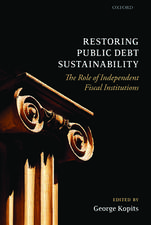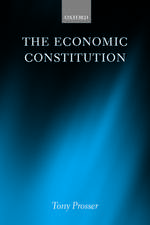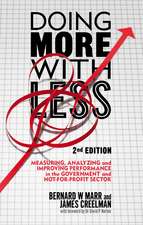Endogenous Public Policy and Contests
Autor Gil S. Epstein, Shmuel Nitzanen Limba Engleză Hardback – 3 sep 2007
| Toate formatele și edițiile | Preț | Express |
|---|---|---|
| Paperback (1) | 637.59 lei 6-8 săpt. | |
| Springer Berlin, Heidelberg – 15 oct 2010 | 637.59 lei 6-8 săpt. | |
| Hardback (1) | 642.36 lei 6-8 săpt. | |
| Springer Berlin, Heidelberg – 3 sep 2007 | 642.36 lei 6-8 săpt. |
Preț: 642.36 lei
Preț vechi: 755.72 lei
-15% Nou
Puncte Express: 964
Preț estimativ în valută:
122.92€ • 131.44$ • 102.48£
122.92€ • 131.44$ • 102.48£
Carte tipărită la comandă
Livrare economică 17 aprilie-01 mai
Preluare comenzi: 021 569.72.76
Specificații
ISBN-13: 9783540722427
ISBN-10: 3540722424
Pagini: 238
Ilustrații: XVI, 221 p.
Dimensiuni: 155 x 235 x 19 mm
Greutate: 0.47 kg
Ediția:2007
Editura: Springer Berlin, Heidelberg
Colecția Springer
Locul publicării:Berlin, Heidelberg, Germany
ISBN-10: 3540722424
Pagini: 238
Ilustrații: XVI, 221 p.
Dimensiuni: 155 x 235 x 19 mm
Greutate: 0.47 kg
Ediția:2007
Editura: Springer Berlin, Heidelberg
Colecția Springer
Locul publicării:Berlin, Heidelberg, Germany
Public țintă
ResearchCuprins
The Basic Contest.- The Policy Contest.- Contest Rationalization ? Microfoundations.- The Extended Contest: With Government.- Endogenous Public Policy.- Culture, Politicization and Relative Rent Dissipation.- Lobbying and Compromise.- The Policy Effect.- Effort and Performance.- Prizes (Size and Distribution) and Efforts.- Asymmetry and Corrective Public Policy.- The Extended Contest: Without Government.- The Social Cost of Rent Seeking when Consumer Opposition Influences Monopoly Behavior.- Strategic Restraint.- Applications.- Monopoly-price Determination.- Privatization.- Migration Policy.- Minimum Wage.- Tournaments.
Textul de pe ultima copertă
This book studies endogenous policy determination focusing on the role of interest groups and their lobbying efforts in the determination of public policy. Applying strategic contest theory as the basic methodology, it clarifies the fundamental parameters that determine the behavior of the government and the interest groups - the two contestants for the "prizes" associated with public policy. The fundamental parameters are the objective of the government, political culture, the contest success function, the stakes of the interest groups and their characteristics. The analysis focuses on the relationship between these parameters and public policy, the contest winning probabilities of the interest groups and their efforts. Comprehensive illustrations of the usefulness of the proposed approach are provided in five specific cases: the determination of monopoly price, privatization policy, migration quotas, minimum wage and promotion in tournaments.
Caracteristici
Applies a single simple methodology, strategic contest theory, to capture the basic forces affecting the relationship between public policy and lobbying or influence activities It presents five illustrations of the usefulness of the proposed extended contest approach Includes supplementary material: sn.pub/extras













